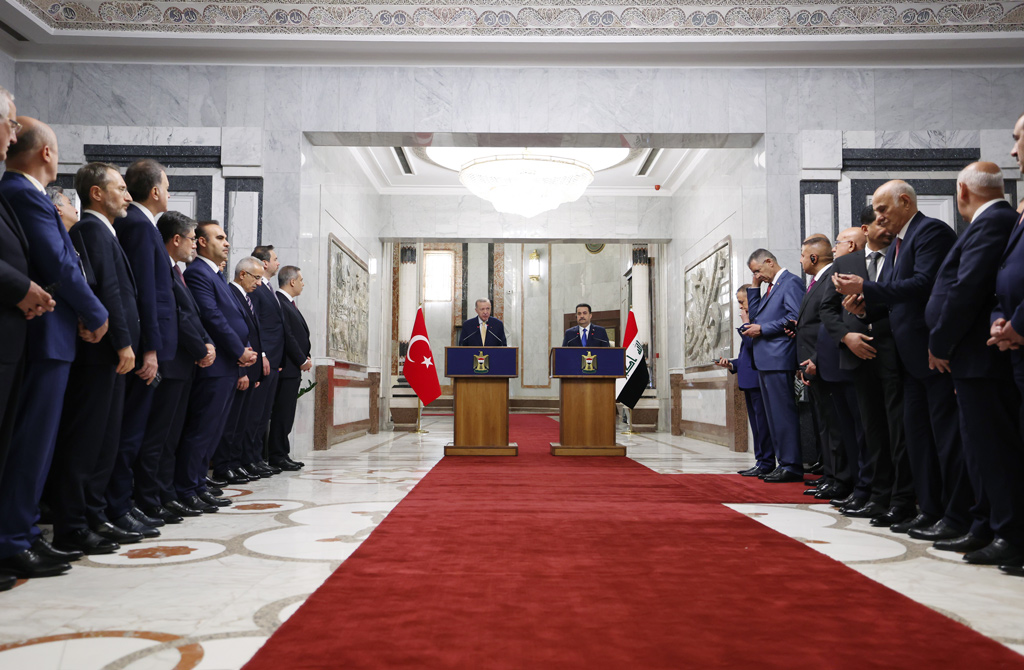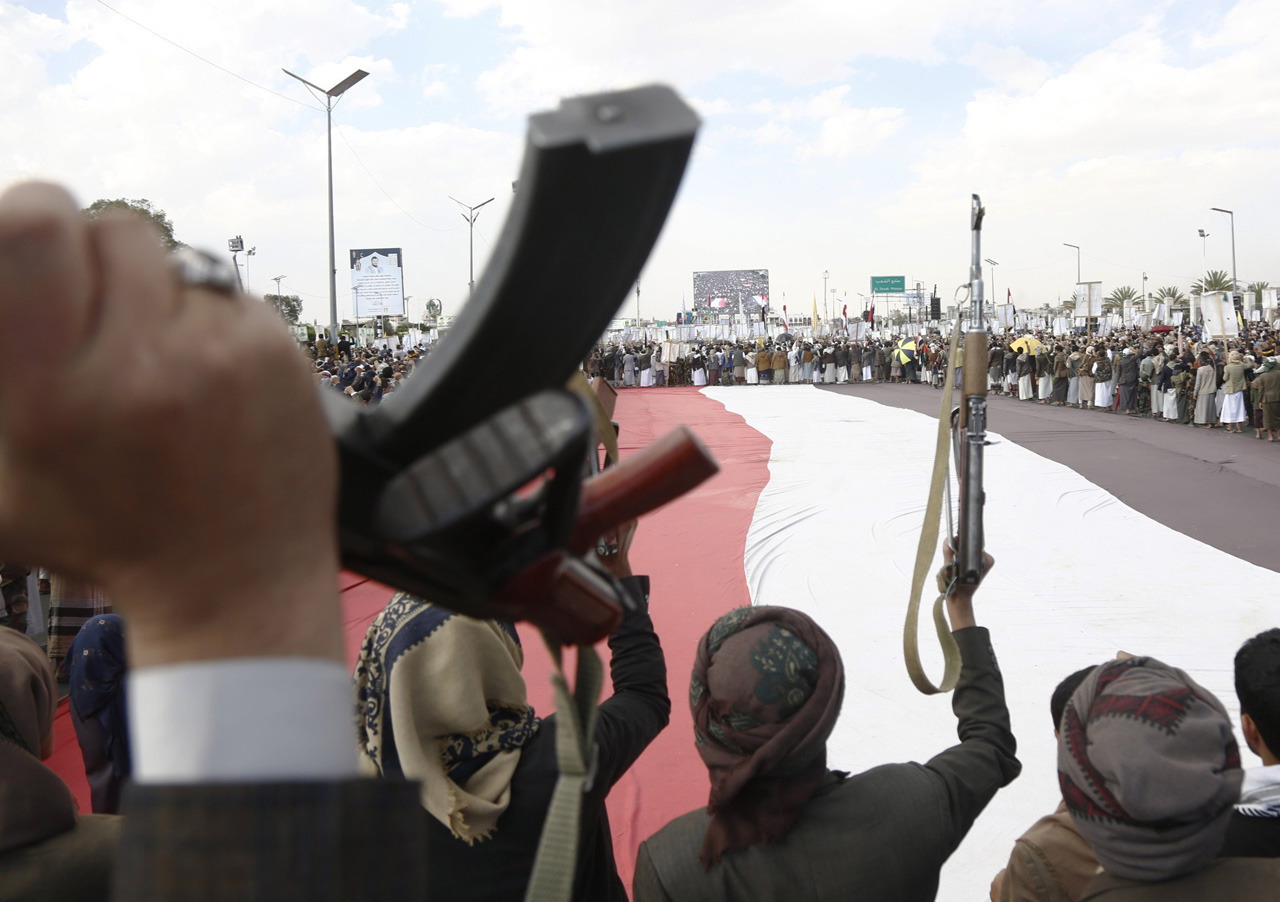President Recep Tayyip Erdoğan paid an official one-day visit to Iraq on Monday. He was accompanied by a large delegation, including Foreign Minister Hakan Fidan, Interior Minister Ali Yerlikaya, Defense Minister Yaşar Güler, Trade Minister Ömer Bolat, Energy Minister Alpaslan Bayraktar, Minister of Transportation and Infrastructure Abdülkadir Uraloğlu, Minister of Agriculture and Forestry Ibrahim Yumaklı and Minister of Industry and Technology Fatih Kacır. Many high-ranking Turkish officials also accompanied President Erdoğan.
President Erdoğan arrived in Baghdad for his first state visit to Iraq since 2011, during his tenure as prime minister. He was warmly welcomed by Iraqi Prime Minister Mohammed S. Al Sudani at the Baghdad International Airport. Initially, he met with his Iraqi counterpart, Abdel Latif Rashid, to discuss bilateral and regional issues. Subsequently, he held discussions with Prime Minister Al Sudani. Concluding his itinerary, President Erdoğan also visited Irbil, the capital of the Kurdistan Regional Government (KRG), a semi-autonomous entity controlling Iraq's north, where he met with the head of the KRG, Nechirvan Barzani, and other leaders.
Considering the signing of 24 memorandum of understanding (MoU) in different issue areas, officials from both sides considered the visit
a turning point in Turkish-Iraqi relations. The visit is expected to improve multifaceted ties between the two neighboring countries.
Focal points of visit
There are several significant aspects of this visit. In this opinion piece, I will briefly mention the important issues between the two countries. First of all, it marks the first visit paid by the Turkish leader in the post-Arab Spring era, carrying profound symbolic weight.
Second, President Erdoğan visited Baghdad and Irbil and met with officials of the KRG's central government. Türkiye has been trying to maintain a balanced stance between Baghdad and Irbil since the most important factor in the development of Türkiye-Iraq relations is Baghdad-Irbil relations. The more conflictual the relationship between the central government and the KRG, the less cooperation there will be between Türkiye and Iraq. Therefore, Türkiye wants to contribute to the resolution of problems between the two governments.
President Erdoğan underlined that Ankara has cooperative relations with the whole population of Iraq, irrespective of their ethnic or confessional background, including Shiite and Sunni Arabs, Kurds, Turkmens, and non-Muslims. Thus, Türkiye confirmed its all-inclusive perspective toward Iraq.
Third, Türkiye and Iraq have agreed on their joint struggle against the PKK, which was classified as an illegal organization within the Iraqi borders by the Iraqi central government last March. Türkiye expects Iraq to take a further step and recognize the PKK as a terrorist organization. Although Iraq did not meet this expectation, the two countries are determined to
fight against all terrorist organizations threatening the countries.
Fourth, Ankara and Baghdad have signed an agreement to take concrete steps to implement
the Development Road, a $17 billion (TL 552.26 billion) project designed to connect the Basra Gulf hinterland to Europe via Türkiye. Qatar and the United Arab Emirates (UAE) also declared their support for the project. According to this project, a highway and railway will be built between the Grand Faw Port, which is about to be completed by the Iraqi government, and the border gate at Ovaköy, south of Türkiye.
Bilateral trade, defense collaboration
The two countries are determined to increase their bilateral trade volume. The total trade volume between the two countries has reached $20 billion. The new target is $50 billion. Türkiye has declared its willingness to play a decisive role in the reconstruction of the Iraqi state. Improving economic relations will have a spillover effect on political and security relations and facilitate the establishment of a strategic partnership. To achieve this objective, Iraq wants to import Turkish defense industry products, including the Bayraktar TB2, Türkiye's first domestically-produced unmanned combat aerial vehicle (UCAV), which have proved effective in numerous conflicts, and ATAK Turkish helicopters.
Furthermore, Türkiye and Iraq are willing to review the reactivation of the Iraqi-Turkish oil pipeline, which has been dormant for the last decade, between the two countries and to initiate the flow of oil to Türkiye and the international market. Türkiye expects the central government and the KRG to agree on the conditions for oil and gas exports.
Moreover, the two countries have agreed to contribute to resolving regional crises and take similar positions on global issues. President Erdoğan has stressed that the two countries and other Muslim countries must act together to help the Muslim nations worldwide. Türkiye and Iraq share the same feelings toward the ongoing genocide in Gaza.
After all, Türkiye and Iraq have agreed to establish working committees between related ministries to ensure the effective implementation of the agreements signed during the visit, which will lay the ground for future collaboration. The two sides have agreed to foster multidimensional relations and bolster cooperation in the struggle against transnational terrorism. Protecting the two countries' territorial integrity and political independence against any internal or external threat is the top priority of the two countries.
Türkiye and Iraq are two interdependent countries that need one another. The leadership on both sides recognizes that they are potentially indispensable partners. Considering their relative power and potential, Iraq needs Türkiye more than Türkiye needs Iraq. Türkiye is ready to provide technical, administrative and economic support to the Iraqi state institutions, including the Iraqi security forces.
As Foreign Minister Fidan mentioned, Türkiye "does not want Iraq to be associated with internal conflicts." Türkiye is determined to work for Iraq's stability since developing the capacity and capability of the Iraqi central government is the main precondition for improving bilateral relations between the countries.
[Daily Sabah, April 24, 2024]








